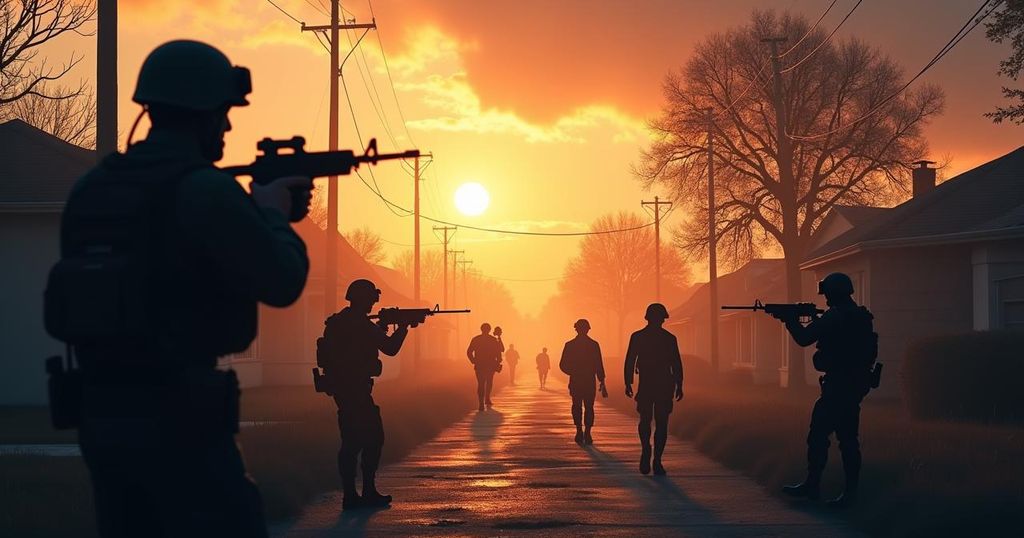Escalating Tensions: Hezbollah, Israel, and Iran in the Middle East Conflict
Hezbollah clashes with Israeli troops in southern Lebanon, coinciding with Israeli airstrikes on Gaza and Iran’s missile attacks on Israel. Global leaders, including those from China, Saudi Arabia, and Italy, express concern and call for diplomatic solutions. Jordan maintains a defensive posture amidst the tensions, while Israel promises a strong military response to Iranian provocations, highlighting a precarious situation in the region.
Recent escalations in the Middle East have seen Hezbollah confront Israeli troops in southern Lebanon, coinciding with intensified Israeli airstrikes on Gaza. Following a notable Hezbollah attack, Israeli media reported that helicopters were dispatched to evacuate injured soldiers from the border region. In the wake of these events, Beijing has called for international intervention to avert further deterioration of the situation, particularly after Iran launched a substantial missile barrage against Israel, totaling 180 missiles. This situation has prompted Saudi Arabia’s Economy Minister, Faisal al-Ibrahim, to express hopes for de-escalation and dialogue amid growing tension. Analysts, like Andreas Krieg from King’s College London, suggest that Israel’s potential military response to Iran may not significantly impair its deeply fortified nuclear facilities. Krieg posited that Israel’s retaliation must exceed previous actions due to the severity of Iran’s recent attack, which he characterized as more impactful than prior strikes. He emphasized that targeting civilian infrastructure, such as oil refineries, would likely not yield effective results. In response to the escalating hostilities, Italian Prime Minister Giorgia Meloni is scheduled to convene a Group of Seven meeting to discuss the crisis further, expressing “deep concern” about the Iranian missile attacks and the escalating instability within Lebanon. Meanwhile, Jordan has asserted its position, with government spokesperson Mohammad Momani affirming that protecting Jordanian territory remains the nation’s foremost duty. Following incidents of missile incursions into Jordanian airspace, the kingdom has implemented precautionary measures, including closing its airspace. Moreover, the Israeli military reported a brief incursion into Lebanese territory, stating that its forces crossed the Blue Line before retreating shortly thereafter. The escalating conflict has also elicited responses from other nations, such as India, which has urged restraint and cautioned against a broader regional conflict. As the situation continues to evolve, Israeli officials have vowed to respond decisively to Iranian provocations. Foreign Minister Israel Katz criticized UN Secretary-General Antonio Guterres for his perceived inadequacy in condemning Iranian actions, stating that those who do not unequivocally condemn aggression against Israel should not be permitted entry into the country. Hezbollah spokesperson Mohammad Afif emphasized the group’s preparedness to continue its resistance, stating that recent actions represent merely the beginning of their campaign against Israel.
The article discusses the recent escalation of conflict in the Middle East, particularly the clashes between Hezbollah and Israeli forces in Lebanon. It highlights key events including Iran’s missile attack on Israel, which was framed as retaliation for the violence in Gaza and Lebanon. The piece outlines responses from various international leaders and organizations, reflecting both concern and calls for diplomacy amidst rising tensions. The geopolitical context includes the longstanding conflicts involving Iran, Hezbollah, and Israel, with broader implications for regional stability and international relations.
In conclusion, the escalating conflict between Hezbollah and Israeli forces reflects a complex geopolitical landscape marked by heightened military actions and international reactions. The involvement of major powers and regional actors underscores the potential for wider instability, while calls for dialogue and diplomatic solutions echo throughout the international community. The situation remains fluid, with both military and non-military responses being weighed heavily by involved authorities.
Original Source: www.aljazeera.com




Post Comment